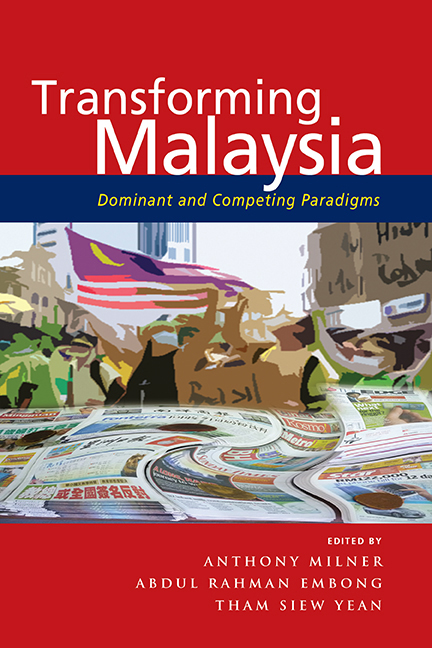Book contents
- Frontmatter
- Contents
- List of Tables and Figures
- Preface
- Acknowledgements
- List of Contributors
- 1 Introduction
- 2 Race and Its Competing Paradigms: A Historical Review
- 3 Knowledge Construction, the Rakyat Paradigm and Malaysia's Social Cohesion
- 4 Race Paradigm and Nation-Building in Malaysia
- 5 Race-Based Paradigm in Poverty Eradication and Income Distribution Analysis and Policy
- 6 Foreign Workers in Malaysia in the Post-Independence Era: Race Paradigm in State Policy, Academic Writings and Public Discourse
- 7 Trade Policy Formulation in Malaysia: Navigating between the Economic and Race Paradigms
- 8 National Security Conceptions and Foreign Policy Behaviour: Transcending the Dominant Race Paradigm?
- Index
7 - Trade Policy Formulation in Malaysia: Navigating between the Economic and Race Paradigms
Published online by Cambridge University Press: 21 October 2015
- Frontmatter
- Contents
- List of Tables and Figures
- Preface
- Acknowledgements
- List of Contributors
- 1 Introduction
- 2 Race and Its Competing Paradigms: A Historical Review
- 3 Knowledge Construction, the Rakyat Paradigm and Malaysia's Social Cohesion
- 4 Race Paradigm and Nation-Building in Malaysia
- 5 Race-Based Paradigm in Poverty Eradication and Income Distribution Analysis and Policy
- 6 Foreign Workers in Malaysia in the Post-Independence Era: Race Paradigm in State Policy, Academic Writings and Public Discourse
- 7 Trade Policy Formulation in Malaysia: Navigating between the Economic and Race Paradigms
- 8 National Security Conceptions and Foreign Policy Behaviour: Transcending the Dominant Race Paradigm?
- Index
Summary
INTRODUCTION
Trade policy can be used by governments as a means for intervening in an economy to promote certain sectors. But such interventions can be costly. Protection, for example, affects allocative efficiency due to the misallocation of resources between protected and non-protected sectors. It can also create rents and rent-seeking behaviour. At the same time, in developing countries, tariff revenues can contribute to the coffers of a country. The demand and supply for protection therefore exerts an influence in the formulation of the trade policies of a country (Rajapatirana 2000, p. 12). Two main factors shape the supply of protection, namely the preferences of trade policymakers, which may be influenced by the prevailing ideology globally as well as locally, and the institutional structure of the government (democratic, authoritarian, multiparty or bi-party). Demand for protection is influenced by individuals, domestic groups and organizations.
The literature on trade policy formulation, especially in developed countries, tends to focus on bottom-up approaches whereby the economic interests of domestic groups as well as foreign lobbying can exert a major influence on the design of trade policies (Ladewig 2006; Gawande et al. 2004). However, the distribution of the costs and benefits of protection are asymmetrical; while the costs of protection in terms of its inefficiency in resource allocation is distributed over the whole society, the gains accrue to the beneficiaries of protection, namely the producer or producers of the protected industry. Hence the outcome of the bottom-up approach depends on the relative strengths of the different interest groups in the demand for protection. For example, producers’ interests rule when they are more powerful than consumers’ interests groups.
In the top-down approach that determines the supply of protection, economic ideology may affect the adoption of protectionist policies. For example, in the 1960s and 1970s, the prevailing economic ideology as well as protectionist lobbies contributed to the use of protection in most countries. However, subsequently, the role of infant industry protection in industrial development is hotly debated with two different schools of thought dominating the literature. In the first school, protection is abhorred based on the 1980s Washington Consensus framework while in the second school of thought, or the 1980s developmental school of thought, government support in the form of protection for infant industries, is deemed to be a key contributory factor to the successful industrialization process observed in South Korea and Taiwan (Woo 2011).
- Type
- Chapter
- Information
- Transforming MalaysiaDominant and Competing Paradigms, pp. 178 - 201Publisher: ISEAS–Yusof Ishak InstitutePrint publication year: 2014



